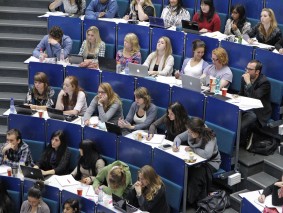About J. (Julie) Nonnekens, PhD
Introduction
Bio

Dr. Julie Nonnekens received her MSc in Biotechnology at Wageningen University in 2009. She obtained her PhD in cancer biology with the focus on DNA repair mechanisms at the University of Toulouse (France) in 2013. Following, she was a postdoc at the Hubrecht Institute working on ribosome biogenesis in cancer and longevity. In 2014 Julie joined the Erasmus MC with a joint appointment as postdoc and is now Assistant Professor at the Department of Molecular Genetics and Department of Radiology and Nuclear Medicine.
"The research of her group bridges the interests of both departments in the field of DNA damage repair mechanisms and nuclear medicine to study the radiation biology of targeted radionuclide anticancer treatment in order to ultimately optimize treatment regimens."Julie has received several (young investigator) awards and is principal investigator on various research grants including the prestigious ERC starting grant. She is board member (secretary) of the Netherlands Society of Radiobiology and co-founder of the European working group on Radiobiology of Molecular Radionuclide Therapy.
Field(s) of expertise
Research
Targeted radionuclide therapies (TRT) are revolutionizing treatment of patients with metastasized cancers. During TRT, radiolabeled compounds are targeted to the cancer cells via specific tumor binding (e.g. via receptors). Once bound to the tumor cells, the radionuclides will induce DNA damage leading to cancer cell death. Currently, more cancer patients are being treated with TRT than ever before. However, it is clear that some patients are being over-treated (resulting in toxicity) or under-treated (no tumor regression). This indicates the clinical need for therapy improvement.
"A better understanding of the radiobiology, i.e. of the biological effects of ionizing radiation of TRTs, could contribute to increasing their effectiveness by providing evidence in favor of one treatment method or regimen over another. With better radiobiological understanding, TRT success could be enhanced and might even progress from mostly palliative towards curative."In order to answer our research questions, we are using a variety of models and tools. From 2D cultured cells and ex vivo cultured human tumor slices to xenografted mice. This broad range of models allows us to study different aspects of TRTs. We use several cellular assays, immunohistochemistry of human tumor tissue or mouse organs, confocal live-cell microscopy and small animal imaging (SPECT, MRI, optical).
Our focus areas are:
- Cellular effects of TRT in tumor and healthy tissues
- Radiobiology of different radiation qualities
- Radiosensitization to improve radionuclide therapy outcome
Education and career
| 2003-2009 |
MSc Medical Biotechnology Wageningen University, Wageningen, The Netherlands |
| 2009-2013 |
PhD University of Toulouse Paul Sabatier III, Toulouse, France |
Publications

Selected publications
- J. Nonnekens, M. van Kranenburg, C.E.M.T. Beerens, M. Suker, M. Doukas, C.H.J. van Eijck, M. de Jong, D.C. van Gent. Potentiation of Peptide Receptor Radionuclide Therapy by the PARP Inhibitor Olaparib. Theranostics 2016; 6(11):1821-1832.
This publication shows the design of RPT combined with a DNA-damage repair inhibitor, which is contributing to a new way of treating patients with RPT. I based this improved treatment regimen on the fundamental DNA repair information obtained in my laboratory. At the moment, >8 different clinical trials have been initiated worldwide based on my findings. Excitingly, I am PI of our own phase I Proof-of-Concept trial based on this work for which we have acquired public funding and patient inclusion is starting in the coming months. - Feijtel D, Doeswijk GN, Verkaik NS, Haeck JC, Chicco D, Angotti C, Konijnenberg MW, de Jong M, Nonnekens J. Intra-tumoral somatostatin receptor 2 heterogeneity confers differential radionuclide therapy response in preclinical neuroendocrine tumor models. Theranostics 2021; 11(2):491-505.
In this publication we describe radiobiological factors influencing RPT. We show for the first time that tumor heterogeneity within and between tumor models affects TRT efficacy and provide a molecular basis for designing re-treatment strategies. - Ruigrok EAM, van Vliet N, Dalm SU, de Blois E, van Gent DC, Haeck JC, de Ridder C, Stuurman D, Konijnenberg MW, van Weerden WM, de Jong M, Nonnekens J. Extensive preclinical evaluation of lutetium-177 labeled PSMA-specific tracers for prostate cancer radionuclide therapy. Eur J Nucl Med Mol Imaging. 2021;48:1339-1350.
In this publication, we have unraveled various radiobiological parameters of RPT to provide preclinical evidence for the most efficient and least toxic tracer. In 2019, this work was nominated for the Marie Curie prize. This prestigious European prize by the European Association of Nuclear Medicine provides great visibility in the nuclear medicine community and highlights the importance of our work when selecting the most optimal treatment modality for RPT. - Tamborino G, De Saint-Hubert M, Struelens L, Seoane DC, Ruigrok EAM, Aerts A, van Cappellen WA, de Jong M, Konijnenberg MW, Nonnekens J. Cellular dosimetry of [177Lu]Lu-DOTA-[Tyr3]octreotate radionuclide therapy: the impact of modeling assumptions on the correlation with in vitro cytotoxicity. EJNMMI Phys. 2020 Feb 10;7(1):8.
This is the first joint publication from my collaboration with the SCK-CEN in Belgium. Here, we prove that biological input is trivial in performing optimal dosimetric calculations and it is paving way for new (collaborative) studies into biology-driven dosimetry. Two follow-up studies on DNA damage modelling and in vivo dosimetry have recently been published as well. - Ruigrok EAM, Tamborino G, de Blois E, Roobol SJ, Verkaik N, de Saint-Hubert M, Konijnenberg MW, van Weerden WM, de Jong M, Nonnekens J. In vitro dose effect relationships of actinium-225- and lutetium-177-labeled PSMA-I&T. Eur J Nucl Med Mol Imaging. 2022 May 12. doi: 10.1007/s00259-022-05821-w.In this publication, we compare for the first time the biological effectiveness of alpha and beta-RPT for prostate cancer treatment that are currently being employed in the clinic. We found a 4-fold increased effectiveness of alpha-RPT compared to beta-RPT with the same radiation dose. This work can help in the future when selecting the best treatment option in clinical practice.
All publications:
Teaching activities
- MSc Infection and Immunity,
- MSc Molecular Medicine,
- BSc Nanobiology,
- BSc Medicine,
- BSc Radiotherapy,
- Medical residents
- Radiotherapy

Scholarships, grants, and awards
Grants

|
European Research Council starting grant (PI) |
|
Investigator initiated industry project (PI) |
|
Investigator initiated industry project (PI) |
|
Oncode – clinical proof of concept (co-PI) |
|
Convergence – Open mind project (PI) |
|
Erasmus MC - Fellowship (PI) |
|
KWF Dutch Cancer Society – Research project (co-PI) |
|
KWF Dutch Cancer Society - Young Investigator Grant (PI) |
|
KWF Dutch Cancer Society – Research project (co-PI) |
|
Medical Research Council UK - Research grant (co-investigator) |
|
Investigator initiated industry project (PI) |
|
Erasmus University Rotterdam - Fellowship (PI) |
|
Fondation pour la Recherche Médicale France - Fellowship (PI) |
My Groups

The radiobiology of radionuclide therapy group (November 2022). From left to right Joke Zink, Hanna Vermeer (back), Pleun Engbers (front), Nina Becx, Thom Reuvers, Julie Nonnekens, Justine Perrin, Mariangela Sabatella, Tijmen de Wolf, Giulia Tamborino.




